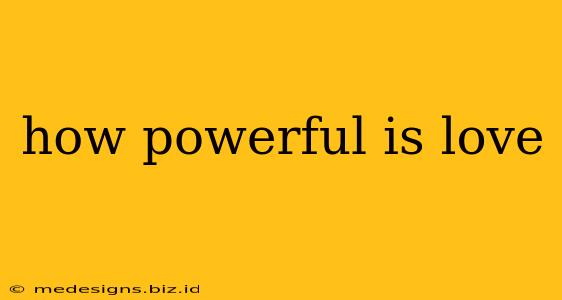Love. A single word that evokes a whirlwind of emotions, experiences, and philosophical ponderings. But how powerful is love, truly? It's a question that has captivated poets, philosophers, and scientists for centuries, and the answer, as you'll see, is far more complex and multifaceted than you might imagine.
The Physical Power of Love: A Biological Perspective
Love isn't just a fluffy feeling; it's a powerful force with tangible biological effects. When we experience love, our brains release a cocktail of neurochemicals, including:
- Dopamine: This neurotransmitter is associated with pleasure, reward, and motivation, explaining the euphoric rush we often feel when we're in love. It fuels the intense desire and focus we have on our loved ones.
- Oxytocin: Often called the "cuddle hormone," oxytocin plays a crucial role in bonding and attachment. It promotes feelings of trust, security, and connection, strengthening the bond between partners, parents, and children.
- Serotonin: This neurotransmitter contributes to feelings of well-being and happiness. However, studies suggest that levels of serotonin can actually decrease during the early stages of romantic love, potentially explaining the obsessive thoughts and emotional volatility often associated with new relationships.
These chemical changes aren't just fleeting; they can have long-term impacts on our physical health. Studies show that strong social connections, including loving relationships, are linked to:
- Lower blood pressure: The stress-reducing effects of love can contribute to cardiovascular health.
- Stronger immune systems: Feeling loved and supported boosts our body's ability to fight off illness.
- Increased longevity: People with strong social support networks tend to live longer, healthier lives.
The Psychological Power of Love: Shaping Our Minds and Selves
Beyond the biological, love profoundly impacts our psychological well-being. It provides:
- A sense of belonging: Love helps us feel accepted, valued, and understood, combating feelings of loneliness and isolation.
- Increased self-esteem: Knowing we are loved and cherished can boost our confidence and self-worth.
- Emotional resilience: A supportive loving environment helps us cope with stress, trauma, and difficult life experiences. The feeling of being loved provides a powerful buffer against adversity.
- Motivation and growth: Love can inspire us to become better versions of ourselves, pushing us to strive for personal growth and achieve our goals.
Different Forms of Love: A Spectrum of Power
It's crucial to remember that "love" isn't a monolithic entity. Different types of love—romantic love, familial love, platonic love, self-love—each possess unique characteristics and varying levels of intensity. While romantic love might be associated with intense passion and desire, familial love provides a sense of unwavering support and security. Platonic love offers companionship and understanding, while self-love empowers us to prioritize our own well-being and happiness. Each form, in its own way, holds immense power to shape our lives.
The Social Power of Love: Building Communities and Shaping Societies
Love's influence extends far beyond the individual. It forms the bedrock of families, communities, and even societies. Strong social bonds, built on love and empathy, are essential for:
- Cooperation and collaboration: Love fosters trust and cooperation, enabling us to work together towards common goals.
- Social cohesion: Love and connection create a sense of belonging and shared identity, strengthening communities and reducing conflict.
- Social progress: Love inspires acts of kindness, compassion, and altruism, driving positive social change.
Conclusion: The Unfolding Power of Love
The power of love is undeniable. From its tangible biological effects to its profound psychological and social impact, love is a fundamental force that shapes our lives, our relationships, and our world. Understanding its multifaceted nature allows us to appreciate its immense significance and harness its transformative potential to build a more loving and compassionate world. It's a force worthy of celebration, understanding, and nurturing.
